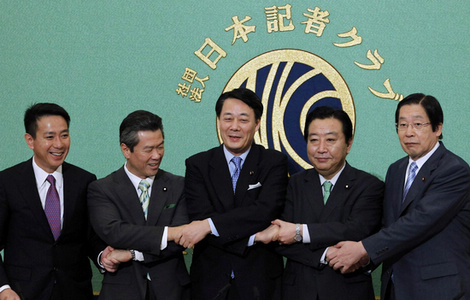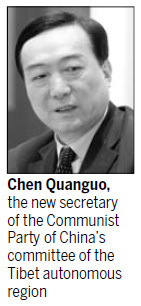Tibet new Party chief: Development high on agenda
Updated: 2011-08-27 08:29
(Chinadaily)
|
|||||||||||
LHASA - Tremendous efforts are needed to boost development in Tibet and the region's long-term stability, said Chen Quanguo, the new secretary of the Communist Party of China's (CPC) committee of the Tibet autonomous region, at a meeting in Lhasa on Thursday.
The CPC Central Committee announced on Thursday that Zhang Qingli, the former Party chief of Tibet, has been replaced by Chen.
|
|
"He is familiar with the work of the Party as well as the economy and is good at handling the overall situation," Zhang said.
"The decision by the central authorities was made in consideration of the actual work needs, a spirit of cadre exchange and the real leadership situation in Tibet," he said.
Chen noted that Tibet holds political significance and has an important strategic position.
"The Party and the central government have high requirements for the development of Tibet, and local cadres of all ethnic groups have great expectations," he said.
Chen Quanguo was born in 1955 in Henan province and obtained a master's degree in economics.
A retired soldier, he started as a worker in an automobile factory in Zhumadian, Henan province.
After serving as a government leader at the county and city levels, he was promoted to deputy governor of Henan province in 1998. In 2003, he became the province's deputy Party chief.
Chen moved to neighboring Hebei province in 2009, where he served as deputy Party chief of the province and governor from 2010.
Regarding Chen's predecessor, Zhang Qingli, Zhang Jinan said that the government "fully recognized" his work in Tibet.
He said that Zhang Qingli will move into another position without elaborating.
Xinhua
Hot Topics
Anti-Gay, Giant Panda, Subway, High Speed Train, Coal Mine, High Temperature, Rainstorm, Sino-US, Oil Spill, Zhu Min
Editor's Picks

|

|

|

|

|

|







